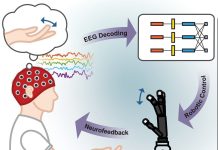
Theta-burst transcranial magnetic stimulation (TBS) has emerged as a potential intervention for improving self-control, reducing cigarette cravings, and consequently, mitigating smoking behaviors.
This approach is crucial for individuals with nicotine dependence, who often exhibit significant structural and functional differences in the brain, leading to diminished grey matter and, subsequently, decreased inhibitory control (IC).
In a study led by Brett Froeliger, professor of psychiatry at the University of Missouri, 37 participants, predominantly in their late 40s, underwent two forms of TBS—continuous TBS (cTBS) and intermittent TBS (iTBS).
The study, published in Biological Psychiatry CNNI, applied magnetic pulses in bursts of three to the participants’ right inferior frontal gyrus, a region closely associated with IC.
The results of the study showed promising outcomes. Continuous TBS was found to enhance inhibitory control, while both forms of TBS were effective in reducing cigarette cravings and overall smoking.
The study sheds light on the potential of TBS in modifying behaviors associated with diminished self-control and impulsivity, particularly in the context of smoking.
Context and Implications
Individuals with nicotine dependence usually struggle with inhibitory control, making it challenging to suppress the urge to smoke in response to environmental cues and stimuli.
Previous research has established that magnetic stimulation can be instrumental in treating various mental illnesses and disorders, with applications ranging from addressing generalized anxiety disorder to major depressive disorder.
This study’s implications extend beyond smoking cessation. Improved inhibitory control through TBS could potentially disrupt the cycle of drug use among individuals battling various substance use disorders.
However, as Froeliger points out, the clinical value of TBS in treating substance use disorders necessitates further research and exploration.
Conclusion
Theta-burst transcranial magnetic stimulation has shown promising results in enhancing self-control and reducing cigarette cravings and smoking.
This breakthrough could be pivotal for individuals with nicotine dependence, who often struggle with decreased inhibitory control due to alterations in brain structure and function.
While this study brings hope to those attempting to quit smoking and potentially those with other substance use disorders, more research is needed to fully understand the clinical applicability and potential of TBS in treating various substance use disorders.
If you care about smoking, please read studies about smoking may increase heart disease risk by 200% and e-cigarette smoke may cause lung cancer and bladder disease.
For more information about brain health, please see recent studies about the cause of weight gain after smoking cessation, and results showing smoking may cause white scars on the brain.
The research findings can be found in Biological Psychiatry CNNI
Follow us on Twitter for more articles about this topic.
Copyright © 2023 Knowridge Science Report. All rights reserved.



